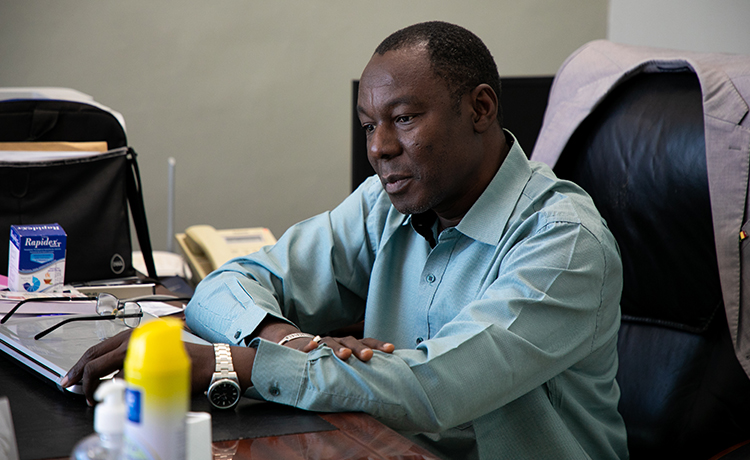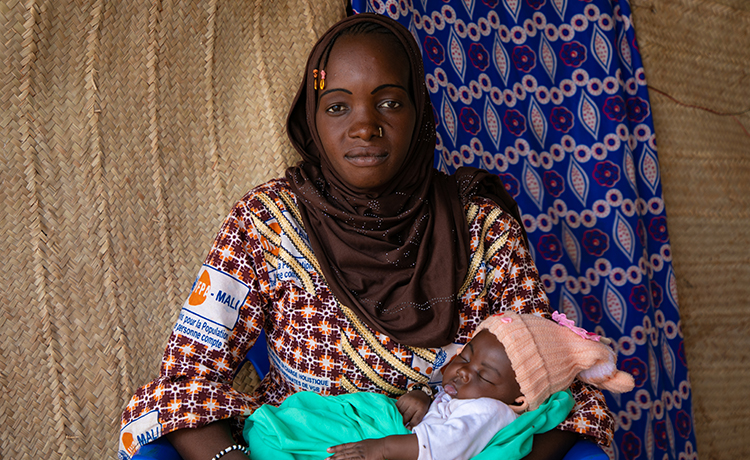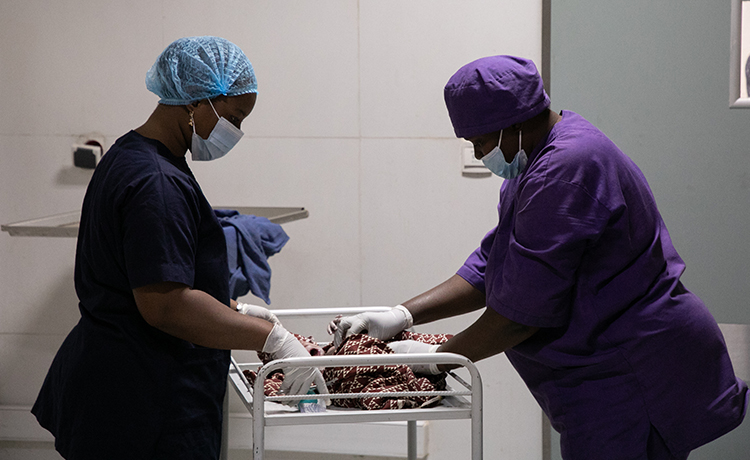News
Mali conflict carries heavy toll for pregnant women amid rising insecurity
- 06 March 2024
News
MOPTI REGION, Mali – “Many women come here to give birth as a last resort,” said Kadiatou Karembé, a midwife at the Sominé Dolo hospital in Sévaré in Mopti, in central Mali. “Sometimes they spend the night on the road because of insecurity, even though their situation is urgent.”
Mali's central and northern regions have been plagued by rising violence and insecurity over recent years. Terrorist groups have taken control of numerous remote villages and wider territory, triggering mass displacements and striking fear into communities.
The UN’s peacekeeping force MINUSMA pulled out of the country at the end of 2023, yet today one in three people are in need of urgent humanitarian assistance and protection. For many, even the journey to give birth is fraught with danger.
“The women transfer here from community hospitals in remote communities,” Ms. Karembé explained to UNFPA, the United Nations sexual and reproductive health agency. “One woman was referred because she was having eclamptic seizures, but she was held up on the way… she died.”
Maternal mortality rates in Mali are estimated between 325 per 100,000 live births, according to 2018 estimates, and 440 per 100,000 live births, according to 2023 United Nations estimates – up to 35 times the rate seen in developed countries. Accessing maternal health services, including emergency obstetric and neonatal care, is all but impossible, especially for people in conflict-affected areas and those who are displaced. Health facilities are scarce, and those that exist are often looted and lacking staff members, many of whom are also now displaced.
“People have great difficulty accessing the hospital,” explained Felix Diarra, Director of the Sominé Dolo Hospital. “One family left themselves three days to get here, but they never reached us. We have ambulances to send people from rural areas, but in crisis areas they have been taken… The crisis has also affected the economy here, but at the hospital we help no matter what.”

Filling the gaps in health care
With funding from Denmark, UNFPA supplied the maternity ward at the Sominé Dolo Hospital with delivery equipment, an operating table, a resuscitation machine and an ultrasound machine. This helped health-care staff to ensure some 2,250 births at the hospital in 2023 – around 187 deliveries every month.
Aissata Touré, 16, was pregnant with her first child. “I had stomach pains for days,” she said. “Eventually a health worker where I live told me there was no possibility of giving birth there. They said to come to the hospital here, but the journey was difficult – and was not at all comfortable.”
She travelled some 170 km from her home in Ngouma to reach the hospital, assisted by family members. “It was frightening,” said her uncle, Abdoulaye Bocoum. “If the family hadn’t been able to afford to rent a car, they wouldn’t have been able to get here. There are no transport partners where my niece lives and no support – basic social services have broken down.”

Supplies, services and support amid a crisis
UNFPA partner HELP sends mobile health to rural areas of Mopti to reach women and girls with essential services, and transports critical cases to health centres. The teams also distribute reproductive health kits, including for safe births and the clinical management of rape, to facilities in all districts.
“The biggest challenge is how to take care of people wounded in attacks – the women and children in particular,” explained Mr. Diarra at the hospital. “In 2022 there were 460 war wounded; in 2023, 480.”
Fatoumata Dienta, 25, faced an unwelcome choice between violence in her village of Dena or a long, uncertain journey to the displacement camp over three hours away. “One evening, terrorists burst in and told us to be gone by the next day,” she told UNFPA. “We had no means of transport… I was two months pregnant and I got sick.”
She eventually gave birth safely at a community health centre, but many more women and girls remain in perilous conditions, crowded into displacement sites in nearby Barigondaga and Socoura.

To meet their needs, UNFPA is distributing maternal and reproductive health supplies and supporting a mobile team of midwives and nurses from a community health centre in Socoura. They provide family planning, prenatal and postnatal consultations and referrals in cases of obstetric emergencies. Staff also offer psychosocial assistance to deal with the trauma of being forcibly displaced and faced with often severe violence.
UNFPA also supported the recruitment and training of more than 50 midwives in the Mopti region in 2023 and renovating 12 rural maternity wards. Eight mobile teams were dispatched across the districts of Bandiagara, Djenné, Koro and Mopti, reaching more than 4,000 women with maternal health services. Eleven ambulance motorbikes were also provided to rural maternity wards, with funding from Canada and Italy.
At the Sominé Dolo Hospital, Ms. Karembé remains committed to helping the women of her community. “Since childhood I have loved the idea of working as a midwife,” she said. “The lack of equipment and power cuts makes work difficult, but I am proud to be able to save mothers and children.”